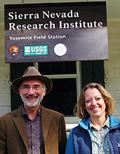
As the new director of UC Merced’s Yosemite Field Station, Becca Fenwick will combine her love of the outdoors and of the educational opportunities such settings can offer.
 “I have always been drawn to world around us and love to foster that in others,” Fenwick said. “Field stations and Yosemite in particular provide a venue in which to do this on many levels, from public outreach to cutting-edge scientific research.”
“I have always been drawn to world around us and love to foster that in others,” Fenwick said. “Field stations and Yosemite in particular provide a venue in which to do this on many levels, from public outreach to cutting-edge scientific research.”
The Yosemite Field Station is used by researchers in UC Merced’s Sierra Nevada Research Institute (SNRI), along with other University of California faculty and guest researchers. It is also the home of the Yosemite Leadership Program for UC Merced undergraduate students and the Adventure, Risk, Challenge program for San Joaquin Valley teenagers to gain confidence in their language skills while taking on physical challenges in a team setting.
Fenwick currently directs the James San Jacinto Mountains Reserve in Southern California, which is also a part of the UC Reserve System. She will start in Yosemite in May.
Born in the United Kingdom and raised in Australia and the United States, Fenwick received her Ph.D. in geology from the Scripps Institute of Oceanography at UC San Diego while working for UC Riverside. She is also an environmental science content editor for Cengage Publishing.
“Becca is an experienced scientist and natural reserve manager,” SNRI Director Roger Bales said. “Her enthusiasm and vision will take the Yosemite Field Station to the next level as it supports signature research and education programs for UC Merced and the broader community.”
One of Fenwick’s first tasks will be hosting SNRI’s annual open house on July 6 at the field station, which also serves as SNRI’s headquarters. The event will feature an overview of faculty and student research, as well as the newly renovated laboratory. Also on hand will be students participating in the summer YLP and ARC programs.
Fenwick has a wide range of international field experience and is well versed in remote sensing technology, which is key to the climate change research being done at the field station. She said she also enjoys working with both faculty and students.
“The cross-discipline collaboration that is at the heart of SNRI is vital to the future of research in the Sierra,” Fenwick said, “and I hope to create a setting that allows these collaborations to flourish.”






